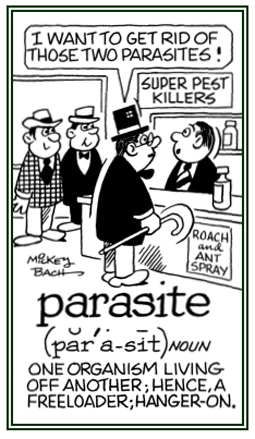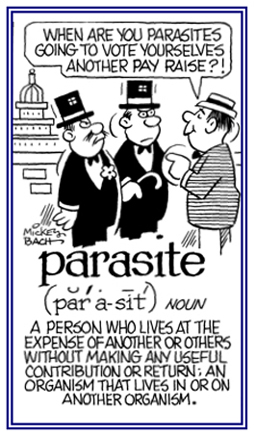para-, par-
(Greek: by the side of, beside, past, beyond; contrary, wrong, irregular, abnormal)
parapsychosis
paraselene
1. A bright moonlike spot on a lunar halo; a mock moon. Also called moondog.
2. A mock moon; an image of the moon which sometimes appears at the point of intersection of two lunar halos.
2. A mock moon; an image of the moon which sometimes appears at the point of intersection of two lunar halos.
parasitaster
A mean or sorry parasite.
1. An organism that lives on another body or in another species, known as the host, of which it obtains nutriments: Mistletoe is a parasite that lives on trees and is used in some cultures as a holiday decoration in homes.
2. A person who receives support, advantage, or the like, from another or others without returning anything useful; such as, anyone who lives on the hospitality of others: Some citizens are of the opinion that people who are receiving financial support from the government for doing nothing in return are really useless parasites and should be forced to work.
3. In ancient Greece, a person who received free meals in return for amusing or making flattering remarks, etc.: Some royal courts in ancient Greece employed parasites to entertain them with music or to provide humorous conversations.
4. From Latin parasitus, from Greek parasitos "someone who eats at the table of another"; "feeding beside" from para- "beside" + sitos "food".

© ALL rights are reserved.

© ALL rights are reserved.
Go to this Word A Day Revisited Index
2. A person who receives support, advantage, or the like, from another or others without returning anything useful; such as, anyone who lives on the hospitality of others: Some citizens are of the opinion that people who are receiving financial support from the government for doing nothing in return are really useless parasites and should be forced to work.
3. In ancient Greece, a person who received free meals in return for amusing or making flattering remarks, etc.: Some royal courts in ancient Greece employed parasites to entertain them with music or to provide humorous conversations.
4. From Latin parasitus, from Greek parasitos "someone who eats at the table of another"; "feeding beside" from para- "beside" + sitos "food".


Go to this Word A Day Revisited Index
so you can see more of Mickey Bach's cartoons.
parasitemia, parasitaemia
The presence of parasites (especially malarial parasites) in the blood.
parasitic
1. Of, relating to, or characteristic of a parasite.
2. Caused by or resulting from the effects of parasites.
3. Relating to or having the habit of a parasite; such as, living on another organism.
2. Caused by or resulting from the effects of parasites.
3. Relating to or having the habit of a parasite; such as, living on another organism.
parasitical
1. Of the nature of a parasite; fawning for food or favors; sycophantic.
2. Of or pertaining to parasites; living on, or deriving nourishment from, some other living animal or plant.
2. Of or pertaining to parasites; living on, or deriving nourishment from, some other living animal or plant.
parasiticidal
An agent that is capable of expelling or destroying parasites; such as, parasitic worms.
parasiticide
1. An agent or preparation that destroys (kills) parasites.
2. Destructive to parasites.
3. An agent that destroys parasites, e.g. such as those that infest the skin.
2. Destructive to parasites.
3. An agent that destroys parasites, e.g. such as those that infest the skin.
parasitifer
An organism that serves as the host of a parasite.
parasitism
1. Symbiosis in which one population (or individual) adversely affects the other, but cannot live without it.
2. Infection or infestation with parasites.
3. Etymology: "a hanger-on, a toady, a person who lives on others", from Middle French (about 1400 to 1600) parasite; from Latin parasitus, from Greek parasitos, "person who eats at the table of another"; from para-, "beside" + sitos, "food".
2. Infection or infestation with parasites.
3. Etymology: "a hanger-on, a toady, a person who lives on others", from Middle French (about 1400 to 1600) parasite; from Latin parasitus, from Greek parasitos, "person who eats at the table of another"; from para-, "beside" + sitos, "food".
The scientific meaning of "animal" or "plant that lives on others" is first recorded in 1646.
parasitization
Infection or infestation with a parasite or parasites.
parasitize
1. To live on or in a host; such as, a parasite.
2. To infest or live on an animal or plant, as a parasite
2. To infest or live on an animal or plant, as a parasite
parasitogenic
Caused by parasites.


